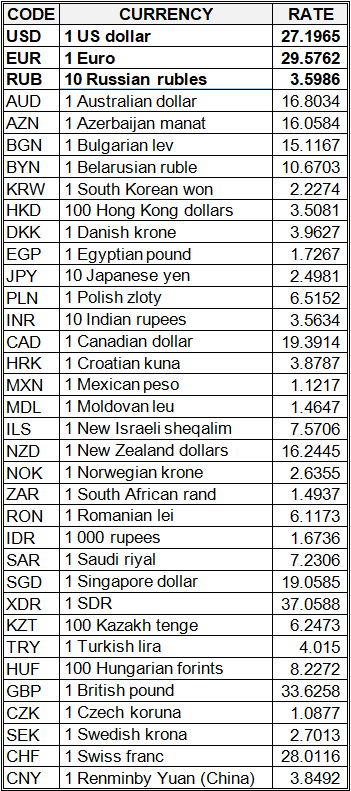
Yuzhny port’s fleet received more than UAH 24 million in income in March 2020, the enterprise’s press service has said.
According to Yuzhny, the figure obtained is 224% of the monthly financial plan. This result of the work was ensured by a large number of ship calls and fire-fighting services for cargo operations at berth No. 3H of Yuzhny port.
Earlier, the port reported that in March 2020 the company handled 1.777 million tonnes of cargo, which exceeds the previous absolute record for a monthly transshipment of 1.650 million tonnes in March 2014 by 127,200 tonnes.
Over the past month, the company accepted 25 vessels, 14 of which are vessels of the Capesize type. The number of large-capacity bulk carriers with a deadweight of more than 150,000 tonnes doubled compared to March 2019.
Darnitsa pharma company purchases hydroxychloroquine, awaits delivery to Ukraine
KYIV. April 8 (Interfax-Ukraine) – Darnitsa pharmaceutical company (Kyiv) purchased hydroxychloroquine for production of medicines and awaits its delivery to Ukraine, Board Chairman of Darnitsa Group Dmytro Shymkiv has said.
“We are already transporting the active substance, namely hydroxychloroquine, to Ukraine. We managed to reserve it for ourselves at a time when most countries closed the export of this substance,” he told Interfax-Ukraine.
Shymkiv said that Darnitsa pharmaceutical company is ready to produce hydroxychloroquine medicines, however, “the main precondition for this is active steps in regulatory matters from the Health Ministry,” he said.
Shymkiv said that Darnitsa specialists studied the experience of treating the coronavirus disease (COVID-19) in China, European countries and the United States, where patients infected with COVID-19 using medicines with hydroxychloroquine are treated as part of clinical trials. Moreover, a precondition for such therapy is the patient’s consent to treatment with the experimental medicine.
“Today, we expect the Health Ministry to follow the measures prescribed in the new laws on health protection and on medicines, which came into force on April 1, 2020. Then we can move on,” he said.
Darnitsa pharmaceutical company is one of the ten largest pharmaceutical manufacturers in Ukraine and the top ten largest hospital suppliers.
National bank of Ukraine’s official rates as of 09/04/20

Source: National Bank of Ukraine

Economic advisor to the Ukrainian President Oleh Ustenko and representatives of the Ukrainian agricultural and chemical industries at a Tuesday meeting discussed the situation in agriculture during the spring sowing campaign and ways to achieve high harvest figures in Ukraine in the conditions of the emergency situation caused by the spread of the coronavirus disease (COVID-19).
President of the Ukrainian Agrarian Confederation Leonid Kozachenko said that now spring field work is in line with the schedule. Representatives of the agricultural sector said that many agricultural segments now need support from the state.
According to the president’s press service, Ukrainian president’s envoy for land affairs Roman Leschenko said that there are three key things that could be achieved for Ukrainian farmers this year.
“The first is that government support in the amount of UAH 4 billion is left, despite the budget outlay reduction plan. The second is the adoption of a basic land law, on the basis of which a series of regulatory legal acts will be adopted in the coming months that will restore order in land relations. The third is that the president of Ukraine is quickly responding to the situation with food security,” the press service said.
According to Leschenko, Ukraine has sufficient volumes to fully ensure its own grain consumption and the implementation of export contracts.

The National Bank of Ukraine (NBU) reduced its property portfolio by 7.7%, to 455,700 square meters in 2019, which allowed saving more than UAH 10 million, according to the NBU’s annual report.
According to the report, to achieve the goals of the NBU’s property management strategy for 2019-2025, it is necessary to reduce the real estate package by another 12.2%, to 400,000 square meters by 21 facilities selling at auction, via privatization and free transfer to other government agencies.
The NBU said that the portfolio was reduced by 34 buildings and structures and six land plots in 2019, at the end of the year it included 409 facilities, namely, some 75 land plots, some 334 buildings and engineering structures.
The National Bank received repayment of debt on non-performing loans of banks and manages 36 land plots with a total area of 112.5 hectares received as debt payment and seven real estate facilities with a total area of 44,700 square meters.
According to the report, the central bank received such property worth UAH 218 million in its ownership in 2019 compared to UAH 85 million in 2018, while its sale as collateral amounted to UAH 181 million and UAH 6 million, respectively.
As reported, in 2019, the National Bank approved the NBU’s property management strategy for 2019-2025, which aims at optimizing the property of the regulator and ensure its effective use.
The NBU’s press service told Interfax-Ukraine that the regulator since 2015 has been disposing property that is not used. Within this period, the central bank transferred 50% of the property to the control of other bodies and ensured its disposal by sale and via privatization, including eight complexes of administrative buildings in the regions, seven social facilities, five garage complexes and a fire station.
“This has saved millions of public funds on the maintenance of property,” the NBU said.